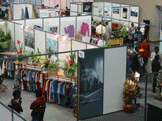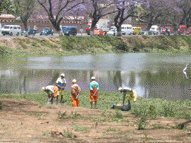 TEXTILE TEXTILE |
Following Asia's footsteps that based its growth on the development of the textile industry, the Big Island, which has qualified for AGOA intends to turn this sector into a bridge for development. In terms of exports it can expect to cash in around USD 2 billion per year. Besides, the creation of 70,000 new jobs is a reasonable estimate of the social consequences this "business opportunity" will have within the next four years.

The Free Trade Zone was established ten years ago and it induced a good number of garment companies among which are: Auchan, Mast, GAP, La Redoute, Décathlon, Carrefour, Bonpoint and H&M. Madagascar can boast to have attracted more than 100 companies in five years, whereas Mauritius took ten years to do so. The quality and low costs of Malagasy labor, combined with tax benefits have attracted a number of investors to the free trade zone. These represent about 45,000 jobs, i.e., around 10% of the private sector's paid labor.
The garment industry constitutes one of the main activities of Malagasy companies established in the free trade zone; 90% of them are concentrated in the province of Antananarivo. Nevertheless, the F.T.Z is gradually diversifying and opening its doors to new industries, such as data processing ones. Soon, vehicles will also be manufactured in the free trade zone if we look at the relocation of the company "Construction Automobile de Madagascar" (CAM) in Manjakandriana, a suburb of Antananarivo. With an investment approaching FF 40 million (EUR 6,1 million), this company will produce approximately 1,000 vehicles during its first year of activity and 5,000 when it starts cruising. Most vehicles will supply the Indian Ocean and East African markets.
| 
"Madagascar is a wonderful country for textiles, but it needs to turn to other sectors that create added value such as computing, i.e., data processing and hardware manufacturing for instance" says Mr. Bruno de Foucault, President of the Free Trade Zone Companies and Partners' Organization (Groupement des Entreprises Franches et Partenaires).
In fact, more than one fifth of imports are for the textile industry's use, whereas it only contributes by 16% to the industrial added value. The integration of the textile sector cannot be but positive for the country. The local production of accessories such as threads, buttons, zippers, packing articles and labels, as well as fabrics will boost the Malagasy private sector. The amount of Malagasy investment into free trade companies has been gradually reduced. Representing 39.5% in 1995, it shrank to 22% in 1997 and finally sank to 20% in 2000. |

